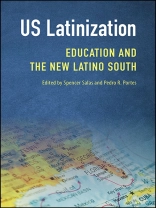Demonstrates how educators and policymakers should treat the intertwined nature of immigrant education and social progress in order to improve current policies and practices.
Offering a much-needed dialogue about Latino demographic change in the United States and its intersections with P–20 education, US Latinization provides discussions that help move beyond the outdated idea that Mexican and Spanish (language) are synonyms. This nativist logic has caused ’Mexican rooms’ to re-emerge in the form of English to Speakers of Other Languages (ESOL) transitional programs, tagging Latinos as ’Limited English Proficient’ in ways that contribute to persisting educational gaps. Spencer Salas and Petro R. Portes bring together voices that address the social and geographical nature of achievement and that serve as a theoretical or methodological resource for educational leaders and policy makers committed to access, equity, and educational excellence.
Innehållsförteckning
List of Illustrations
Foreword
Luis C. Moll
Editors’ Introduction
Spencer Salas and Pedro R. Portes
Part I. The Shifting Social Geography of K-16 Communities
1. Building on Immigrant Parents’ Repertoires: Scaffolding Online Home-School Communication in New Latin@ Diaspora Contexts
Silvia Noguerón-Liu, Deavours Hall, and Peter Smagorinsky
2. Increasing Immigrant Settlement and the Challenges and Opportunities for Public Education in Charlotte, North Carolina
Paul N. Mc Daniel, Susan B. Harden, Heather A. Smith, and Owen J. Furuseth
3. Beyond Commodified Knowledge: The Possibilities of Powerful Community Learning Spaces
Colleen M. Fairbanks, Beverly S. Faircloth, Laura M. Gonzalez, Ye He, Edna Tan, and Melody Zoch
4. Educating to Empower Latina/os in Mathematics in the New South
Anthony Fernandes, Marta Civil, Altha Cravey, and María De Guzmán
5. Ways of Knowing, Community/Technical College Workforce (Re)Development, and ’El Mundo de Hoy’
Mark M. D’Amico, Spencer Salas, Manuel S. González Canché, Cecilia Rios-Aguilar, and Gregory F. Rutherford
6. Professional Development and Funded Interventions as Means to Improve Latino/a Student Achievement: A Research and Development Perspective
Rolf Straubhaar, Paula J. Mellom, and Pedro R. Portes
7. Que las maestras hablaran más con ellos: Children Grappling With Documentation Status at School
Holly Link, Sarah Gallo, and Stanton Wortham
8. Topography of Trámites: Mixed-Status Families’ Map of the New Latino Diaspora
Ariana Mangual Figueroa
9. The Maya Diaspora Yucatan-San Francisco: New Latino Educational Practices and Possibilities
Patricia Baquedano-López and Gabriela Borge Janetti
Part II. Research, Policy, and a Postfirst Generation
10. A Research Agenda for Latin@ Youth’s New Media Use in the New South: ¿Common sense for the common good?
Donna E. Alvermann and Eliane Rubinstein-Ávila
11. Challenges to Policy as a Tool for Educational Equity: The Case of Language and Ability Difference Intersections
Adai A. Tefera, Taucia Gonzalez, and Alfredo J. Artiles
12. The Limits of ’A Thousand Points of Light’ Ideology for a Latino Postfirst Generation
Pedro R. Portes and Spencer Salas
13. The Latino Gender Divide in Education: Are Latinas Really Faring Better Than Their Brothers?
Patricia Gándara
14. Immigration, Social Change, and Reactive Ethnicity in the Second Generation
Alejandro Portes and Bryan Lagae
Afterword
Richard P. Durán
Contributors
Index
Om författaren
Spencer Salas is Associate Professor of Middle, Secondary, and K–12 Education at the University of North Carolina at Charlotte. At the University of Georgia, Pedro R. Portes is Professor and Goizueta Foundation Distinguished Chair in Latin Teacher Education and Executive Director of the Center for Latino Achievement and Success in Education (CLASE). Together, they are the coeditors of Vygotsky in 21st Century Society: Advances in Cultural Historical Theory and Praxis with Non-Dominant Communities and U.S. Latinos and Education Policy: Research-based Directions for Change (with Patricia Baquedano-López and Paula J. Mellom).












